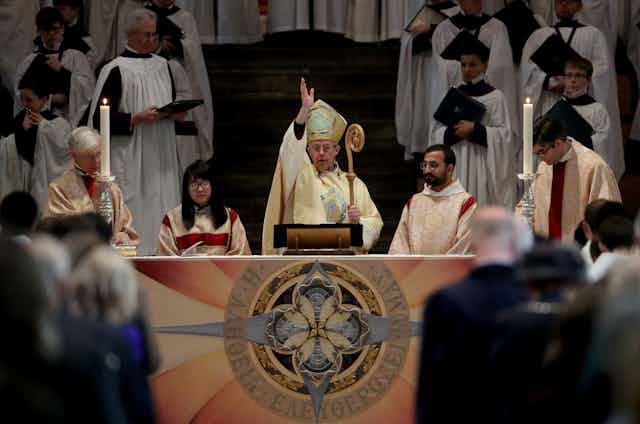Two recent statements from the leader of the Anglican church, Justin Welby, reflect a growing division in the church between a charismatic-evangelical party and a more mainstream majority. The latter are stronger in numbers but the former are now in power.
Welby’s first statement, issued jointly with his number two, the Archbishop of York, John Sentamu, called for a “fresh and uniting vision for all in our country”. It came amid increasingly heated debate over Brexit and their much more neutral stance contrasts with the fervour with which both archbishops backed Remain at the time of the referendum.
The second statement was more theological. Welby told a Christian radio channel that he prays in tongues every morning. Like a masonic handshake, this identified Welby to his fellow charismatic Christians as one of them. Both archbishops are part of this revivalist form of Christianity, which identifies the gift of tongues (praying in a language they believe is given to them by God) as a sign of possession by the Holy Spirit and of being “born again”.
This conflict in the Anglican Church is closely tied to wider divisions over Brexit that affect the UK as a whole.
Conflicting beliefs
The struggle between theological parties for control of the Church of England has been going on for decades. George Carey was the first charismatic-evangelical Archbishop of Canterbury. He was enthroned wearing a mitre emblazoned with tongues of fire – the symbol of the Holy Spirit that fell on the disciples at Pentecost and gave them the gift of “tongues”.
The current archbishops make no bones about the fact that they support the charismatic party in the church, both in England and the wider Anglican communion. Welby comes from the most powerful charismatic church in the Church of England, Holy Trinity Brompton. And increasingly the House of Bishops, representing top clergy, reflects this preference and power has shifted that way.
Around England, the conflict is seen in the growing number of congregations that have a charismatic vicar appointed to oversee them. The “happy clappy” style of worship that they introduce sits uncomfortably with traditional Anglican bells, choirs and formality. Some Anglicans grin and bear it, others feel alienated.

The struggle has come to a political head over Brexit. Analysis of exit polling by Linda Woodhead and Greg Smith after the referendum found that two thirds of Anglicans supported leaving the EU, even when other factors like age and geographical location were taken into account. Remainers were in the minority among both regular and less frequent attenders. But, among evangelicals and charismatics, it was Remain that won majority support.
This shows how different English evangelicals are from their brethren who voted for Donald Trump in the last US presidential election. In England, evangelicals were far more likely to support the liberal cosmopolitan Remain position than their more mainline counterparts. In the US it was the other way round, with a striking 81% of evangelicals supporting Trump.
The difference is explained by the much more genteel profile of charismatic-evangelicals in the Church of England. Like their US counterparts they are predominantly white, but they are middle to upper class. A quarter earn more than £50,000 a year. They are concentrated in London and some, like Welby, are part of a metropolitan and global elite.
Given their internationalist mindset, British evangelicals are more open to immigration than their more mainstream Anglican counterparts. Reducing immigration actually makes English evangelicals less likely to support a policy or political issue, found a 2015 poll.
Katie Gaddini’s research, interviewing members of Holy Trinity Brompton, confirmed that immigration was a linchpin issue determining their vote for Remain, based on their belief that Christians are meant to welcome outsiders. It ties in with Anglican evangelicals’ sense of being part of a worldwide network of like-minded charismatic Christians, not least within the churches of the Anglican Communion.
In sharp contrast to the evangelicals, other Anglican voters in England cited immigration as a major issue persuading them to vote Leave, as they wanted to preserve England’s cultural-ethnic identity. Most important of all, however was their concern about excessive EU interference.
For now, the archbishops and and like-minded bishops are in power at the top of the Church of England, but without the support of most grassroots Anglicans. Their stance on Brexit makes this very plain. Traditionally the Church of England has been “the Tory party at prayer” and, in terms of votes cast, it still is.
But the “old guard” of mainline Anglicans is slowly dying out and the new breed of enthusiastic, charismatic-evangelical clergy are having more success in winning over some young people. Supporters of their approach – like the archbishops – say that speaking in tongues and other charismatic practices are the best way to revive the dying Church of England. Opponents say that they are likely to drive out the last remaining Anglicans and alienate their children. Either way, it will affect the political complexion of England as a whole.

